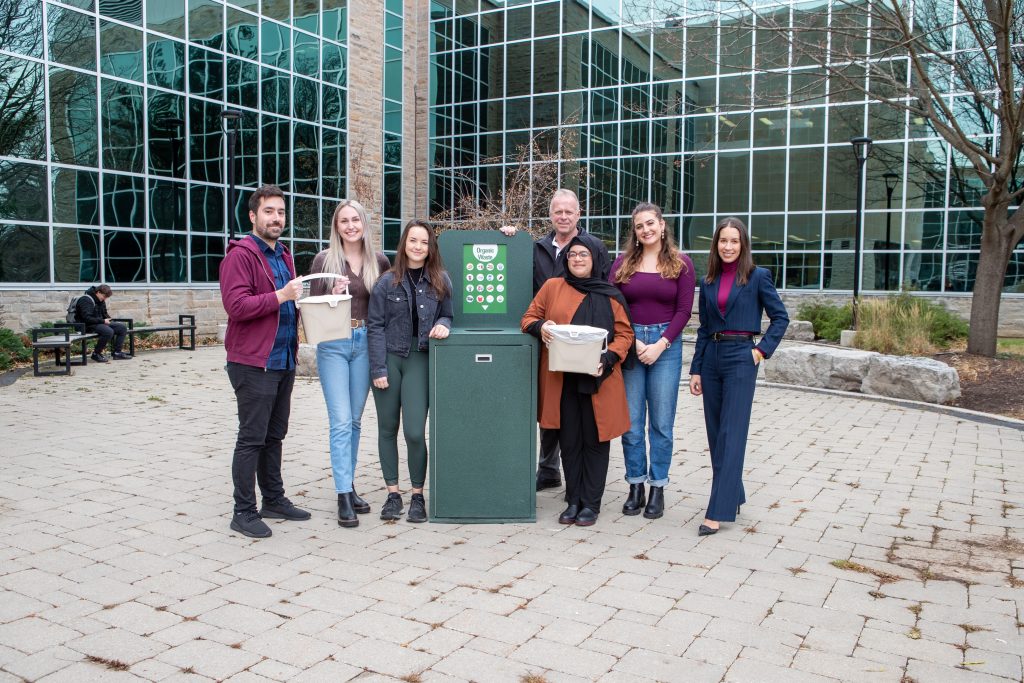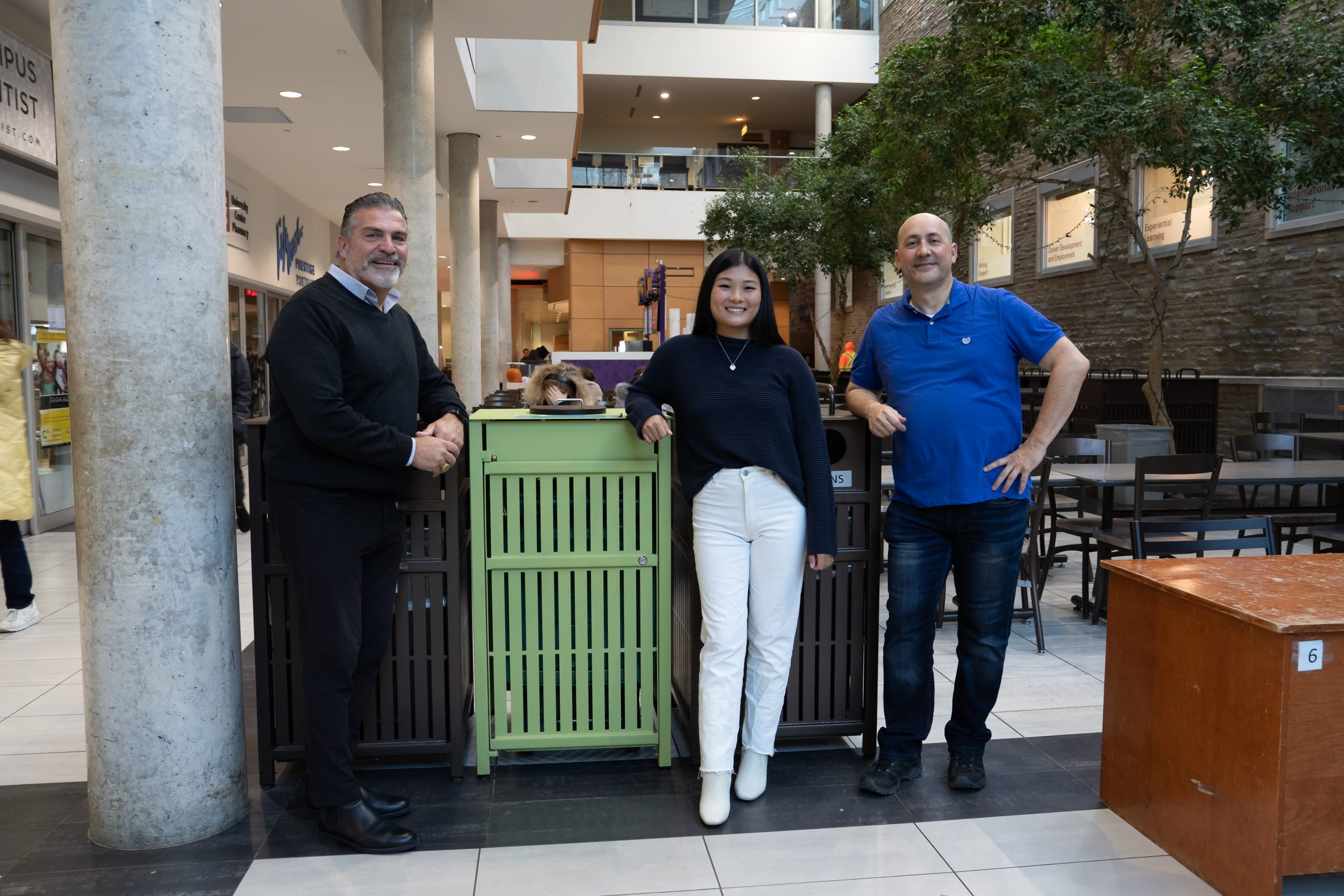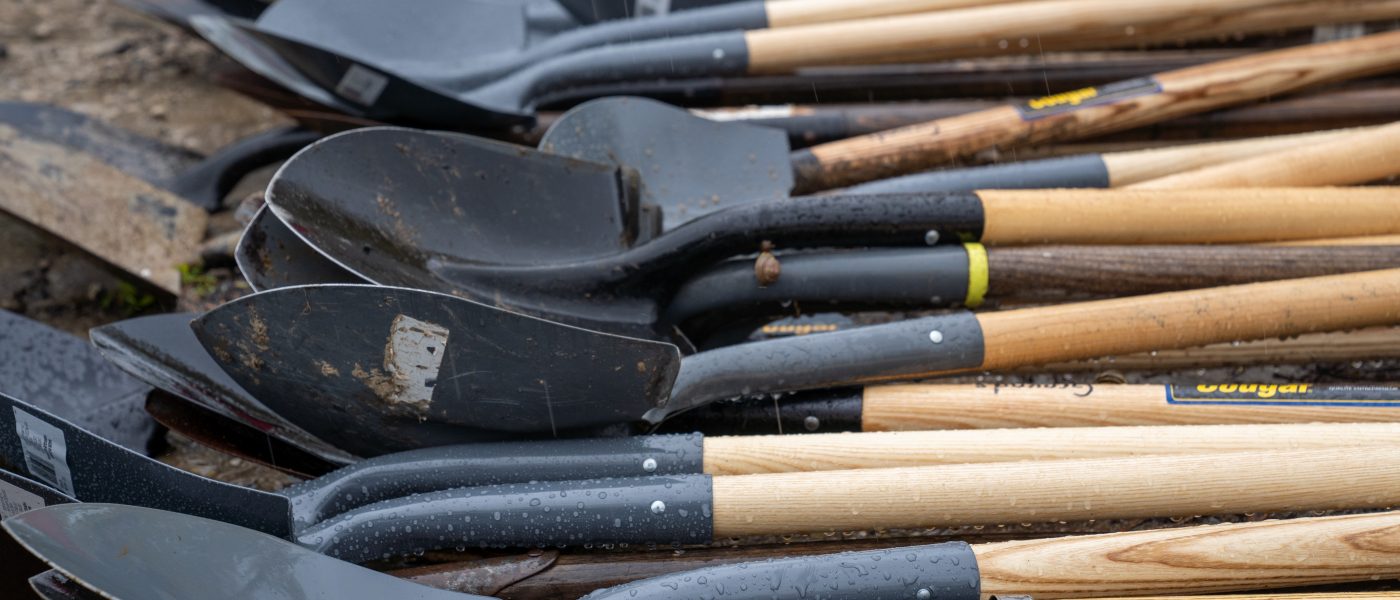
The university is dedicated to transforming administrative and operational practices to be more sustainable: reducing our use of carbon and energy with the goal of being a carbon-free campus, reducing waste and committing to environmentally responsible procurement.
Developing time-bound metrics that benchmark our progress across all strategic drivers is a priority and a responsibility shared by all McMaster leaders. The progress included here is a sample, and more efforts and initiatives will build on this foundation every reporting year.
SPOTLIGHT: Encouraging Composting Champions on campus
A group of McMaster students in an Academic Sustainability Program course are breaking down the benefits of composting on campus, encouraging everyone, including staff, faculty and students, to become Composting Champions. Staff members from Custodial Services supported the students in this experiential learning project, helping turn campus into a living laboratory of sustainability.
Composting Champions are volunteers who make it easy for the McMaster community to dispose of food scraps and organic materials responsibly, wherever they are on campus.
The champion shares composting tips, promotes composting in their area and empties their office compost bin at regular intervals at the convenient drop-off locations on campus. A vendor then takes all the organic waste to make compost that is used to enrich soil and help plants grow.

Information Box Group

Waste: Improving campus composting habits Read More
Fourth-year student Skye Earley collaborated with Luc Bernier, professor from the Faculty of Science, and Carlos Figueira, the director responsible for waste management at McMaster, on a thesis project looking at ways to encourage the use of compost bins on campus.
When food waste goes to the landfill, it produces greenhouse gases as it decomposes beneath inorganic waste. Diverting organics into the compost bin avoids the creation of additional harmful gases and provides campus with a form of natural fertilizer.
The project surveyed students, faculty and staff for input on how to improve composting at an individual level. Expanding and encouraging participation in composting is a part of McMaster’s Sustainability Strategy and the results of Earley’s survey will both be incorporated into Facility Services’ sustainability planning

Sustainable Infrastructure, Energy, and Water: Geothermal green energy system on campus Read the whole story here
McMaster will heat and cool its new campus greenhouse, under construction in front of the Life Sciences Building, with emission-free geothermal energy.
The university anticipates that the new greenhouse will be ready in the spring of 2024, welcoming researchers, faculty, students, staff and a variety of plants to a new place to learn and grow. It will be the second geothermal system on campus, adding to the one that primarily supports clean energy research in the Gerald Hatch Centre. The university continues to explore other campus locations for additional geothermal sites.
Responsible Investing and Sustainable Procurement: Continuing to decarbonize our investment portfolio Read more here
McMaster has surpassed its carbon reduction targets for its investment portfolio a full two years ahead of schedule.
The university has successfully reduced the carbon intensity of its investments by 70 per cent from 2018 levels, surpassing its original goal of 65 per cent by 2025.
Over the past five years, in addition to transitioning to low-carbon investments, McMaster has divested from higher carbon holdings, decreasing its holdings in the Carbon Underground 200 (CU200) to 1.6% from 2.7% last year.
McMaster has also invested $10 million in a global fund which only invests in infrastructure such as wind and solar projects. This investment will grow to $30 million over the coming years.
Read more about our efforts in Responsible Investing and the financial status of the university in the Annual Financial Report.
Metrics: Tracking McMaster’s research related to the United Nation’s Sustainable Development Goals (UN SDGs)
Interested in further exploring McMaster’s contributions to research related to the UN Sustainable Development Goals?
Check out Dimensions, a research output and citation platform available to McMaster University students, staff and faculty to explore research within and beyond the university.
Want to know how many McMaster research papers were published in 2022 related to UN SDG 7: Affordable and Clean Energy (165), or how
McMaster compares to other universities in these areas of research? Explore the data online and reach out to McMaster Library’s Research Impact Specialist to learn more.
Sustainable Operations Metrics
Waste Management
• In 2022-2023, 1,295 tonnes of total waste was generated
• Total waste diversion rate of 52.5%, up from 51.9% in 2021-2022
Water use
• During the 2022-2023 academic year, 572,785 m3 of domestic cold water was used at McMaster, down from 861,734 m3 used during 2019-2020
Energy use and carbon emissions
• In 2022, McMaster emitted 42,265 tonnes of CO2, down from 46,720 tonnes of CO2 in 2021
7,214 Publications with a Sustainable Development Goal Focus
- 1,934 Publications Tagged to SDG 3: Good Health and Well Being
- 181 Publications Tagged to SDG 7: Affordable and Clean Energy
- 953 Publications Funded by the National Sciences and Engineering Research Council (NSERC)
- 882 Publications Funded by the Canadian Institutes of Health Research (CIHR)

